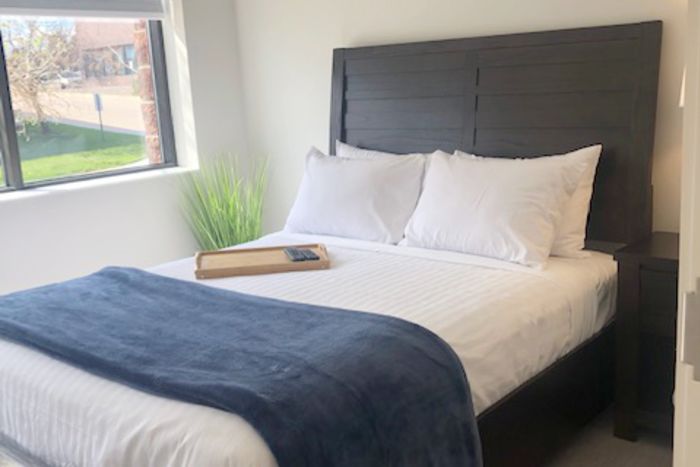If you’re hesitant about calling an addiction treatment center for the first time, you’re not alone. We understand how it can feel like another hurdle to clear on your way to getting reliable residential care.
But whether you’re seeking treatment for yourself or for a loved one, and whether you’ve researched inpatient rehab centers for weeks or not at all, that initial phone call is the first step to actively getting help. Plus, talking to an admissions specialist will help you determine if a particular treatment facility is the right fit for you.
Knowing what to expect when you get on the phone with a rehab center can give you the confidence you need to make that first call. Keep reading to learn more about inquiring at a residential treatment center.
Who Answers the Phone?
When you call a rehab center, you’ll talk to an intake or admissions specialist. Sometimes a receptionist will answer first and redirect your call.
It’s important to know that, in general, a rehab’s admissions staff performs the same functions as a sales team. Their job is to sell their rehab center’s treatment to potential clients. Yes, they want you to get the help you need, but typically they want you to get that help through their program. This is especially true if you call a hotline that’s trying to refer you to a rehab center for a fee.
Residential rehab admissions staff are usually trained to help people going through various mental, emotional, and physical struggles when they call. And all rehab staff should have ethical standards for interacting with potential clients and helping them get the treatment they need.
Still, there’s no guarantee you’ll receive unbiased information when calling a treatment center. Knowing which questions to ask, and what questions to be prepared to answer, will empower you to get the facts you need and to determine for yourself if the rehab you’re calling is really the right one for you.
What Happens When You Call?
Usually, the admissions specialist will begin the call with a series of questions to learn more about you, your medical and substance use history, and your current condition. This series of questions is often referred to as an “initial assessment,” and is quite standard between different facilities. Initial assessments usually occur via telephone. But you can also do it in-person if you visit a rehab center to see their facilities.
Note: This initial admissions assessment is different from your check-in assessment, which is a much more in-depth evaluation performed by licensed mental health professionals and medical staff when you arrive at an inpatient facility for your stay.
The purpose of the rehab intake assessment1 is for the center to determine what level of care you need and any logistics that need to be arranged for your treatment. As the U.S. Substance Abuse and Mental Health Services Administration (SAMHSA) describes, this assessment helps “pinpoint places where there are—or may be—concerns.”
Having an in-depth conversation about your background and concerns also allows the rehab to determine which standard length of stay is appropriate for you and if their core program needs to be adjusted to meet any of your specific needs. For example, if you’re struggling with sex addiction and not a substance use disorder, you might be scheduled to join Sex and Love Addicts Anonymous meetings instead of Narcotics Anonymous meetings during your stay.
During your intake assessment you’ll also have the chance to ask any additional questions you have, like details about the center’s facilities or specific therapies offered. And remember—everything discussed during this phone call is to help you decide if the rehab center is the best match for you.
Basic Questions Inpatient Rehab Centers May Ask
When you call a rehab, the questions you’re asked may vary slightly from center to center. This is because each addiction treatment center’s intake questions1 “depend on the types of clients treated and the kinds of services offered,” as explained in a SAMHSA report on Treatment Improvement Protocol.
No matter who you call, you’ll probably be asked to share most of the same general information. This includes your basic demographics and background, your medical and family history, and your substance use history.
According to another SAMHSA report on Substance Abuse Treatment for Persons with Co-Occurring Disorders, you should also be prepared to discuss any “medical issues (including physical disability and sexually transmitted diseases), cultural issues, gender-specific and sexual orientation issues, and legal issues,” which will further aid the treatment matching and planning process.2 Rehabs may ask you questions about the following topics:
Basic demographics and background
- How old are you?
- Where are you from?
- What is your racial and ethnic identity?
- What is your gender and sexual identity?
- What, if any, is your religious background?
- Do you actively follow any religious practices?
Medical history
- Do you have any current or past physical health conditions (like cancer, diabetes, heart disease, etc.)?
- When were you diagnosed and how old were you?
- What treatments did you receive?
- What were your treatment results?
- Did you, or do you currently, experience any complications during treatment?
- Do you have any current or past mental health conditions (like depression, anxiety, PTSD, etc.)?
- When were you diagnosed and how old were you?
- What treatments did you receive?
- What were your treatment results?
- Did you, or do you currently, experience any complications during treatment?
- Have you had any major or minor surgeries?
- Did you, or do you currently, experience any complications due to these surgeries?
- What are your current and past prescription medications?
- Have you ever had any negative reactions to medications?
Family history
- Do/did any of your parents have problems with alcohol or other drug use?
- Does your partner have a problem with alcohol or drug use?
- Do any of your second- or third-degree family members have a history of substance or alcohol use disorders?
- Do your relatives have any other notable physical or psychological conditions?
Substance use history
- What substances do you currently use?
- What substances have you used in the past, but are no longer using?
- How long have you been using substances and/or alcohol?
- Do you have any co-occurring conditions or dual diagnoses?
- Are you, or have you ever taken any prescription medications to treat substance or alcohol use disorder?
- Have you ever had any negative reactions to medications?
Even if you don’t have the answers to all these questions, or some of them are difficult to discuss, understanding your complete personal and family history is the starting point of addiction treatment.1 “The assessment examines a client’s life in far more detail so that accurate diagnosis, appropriate treatment placement, problem lists, and treatment goals can be made,” explains the U.S. Center for Substance Abuse Treatment in a SAMHSA report. “Usually, a clinical assessment delves into a client’s current experiences and her physical, psychological, and sociocultural history to determine specific treatment needs.”
After discussing your general background and history, you’ll have the chance to ask any of your questions about rehab in general and about that facility’s staff, policies, and programs in particular.
What to Ask a Residential Rehab Center
Before your first phone call with any rehab center, it’s a good idea to write up a list of questions you want to ask. In addition to helping you feel even more prepared, this ensures you’ll get all of the information you need to make an educated decision about your treatment.
You may have more questions than those listed below, but these are a good starting point to help you make the most out of your call.
Learning More About Residential Rehab—The Basics
How much does treatment cost?
“How much is this going to cost me?” is the first question on most people’s minds when they call a rehab center. Knowing the costs of treatment upfront will allow you to financially prepare for inpatient rehab, which in turn can give you the mental clarity to fully focus on your recovery while you’re in treatment.
In the United States, the Affordable Care Act requires most insurance policies to cover up to a certain level of treatment. Heather Charlet, Director of Admissions at Gallus Detox Center in Colorado, explains that coverage “depends on each individual’s policy and what their out-of-network benefits are. We run a verification of benefits for every patient that has insurance to see what we’re able to cover.”
“We also have self-pay rates that are guaranteed, regardless of what they may need during their stay. They don’t get back bills when they’re with us: the cost is the cost.”

There are a few additional cost-related questions you should be sure to ask:
- Does this treatment center accept my insurance?
- If not, what are my payment options or how can I pay for treatment?
- Is full payment required upfront or can I pay a deposit to hold my spot?
Read more about how much rehab costs.
Is there a waitlist? If so, how long is it?
Many people seeking treatment want to get the help they need as soon as possible. Because of the extensive number of treatment centers available, waitlists are generally not common in the U.S. But in Europe and Australia, where relatively fewer luxury rehabs are sought after by those wanting top-quality treatment, having to wait to check into treatment can be a real concern.
Because addiction is by nature an urgent issue, whether a center has a waitlist or not may determine if you can, or want to, attend treatment at that facility. Knowing this information right away can save some time in making your decision.
Tell me more about your center’s treatment philosophies and modalities.
The path to recovery is an incredibly personal journey: What works for one person may or may not work for another. That’s why so many different methods are used to treat substance use disorders and mental health conditions.
Faith-based, 12-Step, non-12-Step, and holistic rehabs are examples of rehab treatment approaches that underpin entire programs and may appeal to different types of people. Meanwhile, treatment modalities, or therapies, can range from conventional, such as talk therapy and cognitive-behavioral therapy, to complementary therapies like art therapy and adventure therapy, to name a few.
The best treatment options for you will depend on your past treatment experiences, your substance use history, and even your personal interests. Maybe you already know what kinds of treatment methods you’re interested in trying or continuing. Or perhaps having a variety of modalities is important so you can try something new or discover your preferences.
Learn this information so you can reflect on whether the center’s overall approach resonates with you, whether you’re interested in doing any of the particular therapies, and to decide if the treatment philosophies align with your personal beliefs.
How qualified is your staff?
Knowing who will be helping you throughout your time in treatment is just as important as knowing what modalities are used. These staff-related questions will help you get a clearer picture of the people overseeing your treatment:
- What kind of professionals will I be interacting with on a day-to-day basis?
- Who will be on my treatment team?
- What are their qualifications?
Learning More About Residential Rehab—The Details of Your Stay
What types of clientele does your program serve? Do you offer the specific specialized services I need?
These two questions are important for several reasons:
- Some rehab centers are tailored to the particular needs of specific clientele. There are luxury rehabs that cater to executives and wouldn’t be appropriate for teens, for example.
- If you identify with ethnic or sexual minority groups you may require specific resources to address your minority experiences. For example, a transgender person may have trauma around their lived experiences and would likely need an LGBTQ+ affirming environment to safely process this during treatment.
- There may be other specialized services that you know you need for a successful treatment experience, such as co-occurring disorder treatment or trauma-informed care.
Whether or not these apply to you, asking this question helps you make sure the rehab center can adequately serve you. In addition to having resources to address certain experiences, the main value of being in a program with similar clientele is that this can create an atmosphere of collective safety and comfort that allows you to do vulnerable therapy and group work.
Do you offer on-site detox?
Some people require detox before they begin inpatient treatment. And some residential rehab centers, like Cypress Lakes Lodge and Camino Recovery, are equipped with the facilities and medical staff necessary to offer detox services on-site. Alternatively, other centers may offer detox off-site through partnerships with local medical facilities.

There are different settings for detox treatment and varying levels of care,3 which is why you should discuss if the rehab center can provide you with the appropriate detox program. If needed, detox is an essential step in beginning treatment. In a report on detoxification, SAMHSA describes that “this phase of treatment frequently requires a greater intensity of services initially to establish participation in treatment activities and […] increase the patient’s readiness for and commitment to substance abuse treatment.”
Please remember that when done incorrectly or on your own, detox can be potentially harmful to both your physical and mental health. Because of this, it’s important to consult with your physician or a qualified medical professional when making any decisions about detox.
What does the initial check-in assessment include?
Most addiction treatment centers will carry out additional in-person physical and psychological assessments when you first arrive. The more extensive these check-in assessments are, the better, because this information is used to determine your treatment program.
“What we find a lot of times is people come to us with multiple comorbidities, very complex situations, so we use an intensive assessment center to fill out our continuum of care,” says Jerry Vaccaro, President of All Points North Lodge. “We firmly believe there has to be multiple options for people who require treatment, so they can plug in where their needs are.”

How many clinical hours does your program include?
A key indicator of a rehab center’s value is how many individual therapy sessions you’ll actually receive per week. The more time you get to spend with your counselors and therapists, the more help you’re directly receiving. Some treatment programs consist mainly of group therapy sessions, while others include more one-on-one time with practitioners. Asking about program details like this upfront can help you avoid unpleasant surprises when you arrive.
What are the center’s policies and expectations with regards to contacting loved ones? To what extent am I allowed to use my laptop or cell phone?
Relationships with your partner, family, and friends are an essential part of your life and recovery. Don’t let fear of not knowing whether you’ll be able to maintain your relationships with your partner and/or family be the roadblock that stops you from getting help.
If relationships are an important factor for you, ask the center what their outside device or communications policies are:
- To what extent is my family going to be brought into treatment?
- Do you have a family program? If so, what does this look like?
- Will my partner/family be able to visit?
- Am I going to be able to maintain my relationships while I’m in treatment?
- Will I be able to video call or chat with my loved ones?
- Will I be allowed to use my personal device for these calls?
Learning More About Residential Rehab—Important Facts About Aftercare
Is it possible for me to extend my stay if necessary?
Most inpatient rehab programs have set lengths of stay that typically range from 30 to 90 days. Your admissions specialist can help you determine what length of stay is appropriate for you. Still, you never know what’s going to happen and if you’ll feel fully prepared to check out once you’ve reached the benchmark time spent in treatment. And while most centers are happy to allow clients to extend their stay, if yours is waitlisted, this may present an issue. It’s helpful to know whether your center allows their clients to continue receiving residential treatment if required.
What kind of continuing care, if any, is provided?
Most people require ongoing support and care after their stay at a residential rehab. “What happens after treatment is probably the most important question about treatment, because that’s what people go back to after they leave from treatment,” says Jan Gerber, CEO of Paracelsus in Zurich, Switzerland. “The whole concept of aftercare is maybe even more important than the treatment itself.”

Certain components of continuing care, such as ongoing therapy and a strong support network, are essential to relapse prevention. But aftercare options vary greatly between rehab centers. Some centers may not offer continuing care, or may offer these services at an additional cost. So make sure you find out as much information as possible about your rehab’s aftercare program.
Ask the Questions That Matter to You
Asking all of the questions above is a great way to suss out whether a residential rehab center feels like a good fit. These questions may lead to more questions that are specific to your personal needs. For example, if you know you’re going away for a month to receive treatment, maybe you already know you’re going to need specific accommodations or allowances. Or if you have certain issues to address while you’re in treatment, you need to make sure the center can adequately help you.
Don’t be afraid to ask all the questions you have! Only you can decide if a center is going to be able to meet your needs and offer everything you’re looking for during your stay.
What Happens Next?
Once your initial assessment is over and all of your questions have been answered, you’ll likely receive treatment and length of stay recommendations from your admissions specialist. At this point, you can also schedule a visit to tour the facility, if it’s feasible for you, before you make any final decisions.
Your admissions specialist will then review the results of your intake assessment with you. This may happen later, over the phone, or even once you’ve checked in to the facility. It’s extremely beneficial to know your results, because “personalized feedback on the risks associated with [your] own use of a particular substance and how [your] consumption pattern compares to norms—especially for [your] own cultural and gender groups—is a powerful way to develop a sense of discrepancy that can motivate change,” according to a SAMHSA report on Enhancing Motivation for Change in Substance Abuse Treatment.
Lastly, if the facility isn’t the best fit for you, or if you decide it’s not possible at this time for you to physically attend residential rehab, you can ask for additional recommendations. The admissions team might connect you with other resources depending on their level of expertise. Ideally, they would be able to point you in the right direction.
“In my role as admissions coordinator, I help families find treatment for their loved ones,” clarifies Quinn Tremblay, Admissions Coordinator at McLean Fernside. “I guide them through the process, since a lot of families are new to addiction treatment. Sometimes this includes getting them to insurance-based programs, or even helping them get services through their community or state.”

Figuring Out the Details
Once you’ve chosen the rehab center that’s the best fit for you and doesn’t have a wait period (or if it does, has a wait period of less than 4 weeks), the admissions team will also help you organize the logistics. This may look like your intake specialist giving you practical, specific advice or taking action on your behalf, like helping you request time off of work for treatment and arranging your travel to the center.
A rehab admissions specialist should be able to assist you with anything on your to-do list prior to check-in:
- Scheduling an arrival date
- Contacting your insurance provider
- Paying for treatment
- Requesting time off work
- Informing your family and friends
- Planning what to pack
- Arranging transportation to and from the facility
Learn more from our ultimate guide to choosing a treatment provider.
Choosing the Right Rehab Center for You
No matter where you’re at in the process of seeking help, it’s okay to not have all of the answers. The first phone call to a residential rehab is a key first step towards getting the help you need. Before you pick up the phone, be the most prepared you can be with up-to-date, accurate information about residential rehab so you can confidently make an educated choice about which center is the best one for your unique wants and needs.
Browse our collection of luxury rehabs to learn more about available program options.
Frequently Asked Questions About Calling a Rehab Center
What happens when you call a drug rehab?
An intake specialist will ask a series of questions to learn more about you. This helps them determine the level of care you need and other treatment details. It’s also a chance for you to find out more about the center.
What questions should I ask when choosing a drug rehab?
These questions can help you make the most out of your call:
• How much does treatment cost?
• Is there a waitlist? If so, how long is it?
• Tell me about your center’s philosophy and treatment methods.
• What kind of specialists do you have on staff?
• Do you offer on-site detox?
• How many clinical hours does your program include?
Who answers the phone when you call a rehab?
An intake or admissions specialist picks up. Sometimes a receptionist will answer and redirect your call. All rehab staff should follow ethical standards when interacting with potential clients.
